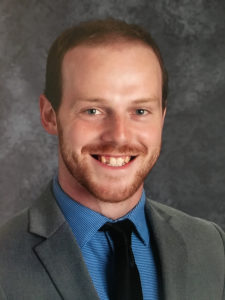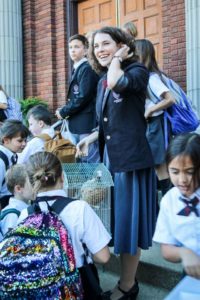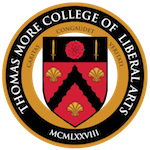by Patrick Kuplack, ’21
“But they that are learned shall shine as the brightness of the firmament: and they that instruct many to justice, as stars for all eternity.” (Dan. 12:3)
The academic year at Thomas More College is now well underway. For many of us, it will be our last here. For those soon to graduate, a new life lies ahead, and we are faced with the daunting prospect of having to make crucial decisions about our futures. Some will join our country’s military, others the workforce, still others will pursue additional education or specialized training; some will follow in the footsteps of Christ as religious. There are others yet who opt to follow Christ in another way, imitating Him as educator and story-teller.
The Salesian Fathers—of whom the great and holy St. John Bosco was one—tell us that the role of the teacher is second only to that of priest or religious. The teacher is a molder of souls, entrusted with children by parents who hope to see their sons and daughters grow academically, physically, emotionally, and spiritually under the influence of dedicated men and women. True Catholic education best enables this formation. I caught up with alumni of Thomas More College who, as teachers, strive daily to bring truth, goodness, and beauty into the lives of their students.
 Paul Guenzel, ’14, began his third year at the Chesterton Academy of Milwaukee, where he teaches a variety of high school literature courses and two Latin classes. Mr. Guenzel guides his students through the Western tradition from Homer to Flannery O’Connor.
Paul Guenzel, ’14, began his third year at the Chesterton Academy of Milwaukee, where he teaches a variety of high school literature courses and two Latin classes. Mr. Guenzel guides his students through the Western tradition from Homer to Flannery O’Connor.
What inspired you to teach at an independent Catholic school?
Thomas More College was my first and most influential inspiration for pursuing education as a profession. As it was perhaps the most formative four years of my life, I wanted to give that same thing to others.
Independent Catholic schools like Chesterton Academy are an important apostolate of the Church, because a much deeper formation is achievable than at public schools. Scheduled holidays and school-wide celebrations attuned to the Church’s liturgical calendar afford students an identity-giving tradition they will never be able to forget, one which is invariably a strong tie in keeping young men and women faithful in Christ.
What do you enjoy most about being in the classroom?
My favorite part about the classroom is having good conversations about beautiful and worthwhile topics with young people who are trying to learn how to live well. It’s like an apprenticeship in the art of being human.
How has your education received at TMC influenced your work in the classroom?
Two aspects of my time at Thomas More College stand out as especially influential in my teaching. The first is the witness of the teachers. They taught me that it is possible to be in full pursuit of virtue and wisdom, while at the same time being humble. They were clearly closer to the goal than I, but like Our Lord, they condescended to work with us, study with us, and get to know us in friendship.
The second thing is the community. TMC’s community was for me a model of what good community life could look like, in college and after. We studied doggedly, prayed daily, sang, feasted, fasted, and worked hard to grow wise and virtuous together as a community. The notable absence of electronics on a large scale forced us to find pleasure in more human things, such as playing music and conversation. These are things I attempt in small ways to introduce in our high school.
What advice would you have for students interested in pursuing teaching as a career? 
Prioritize the professional side of the career as clearly as the missionary side of it. Be professional, be frank with your employers, and if you make a commitment, keep it. Many teach for a year to see if they like it and then pursue another career, leaving good schools in the difficult position of hiring new teachers each year. Know the good to be done there, know the risks of the profession, and know yourself.
Why would you recommend your school in particular to any TMC students interested in teaching?
Chesterton Academy is a good fit for Thomas More College graduates because its goal is similar: to raise up joyful leaders and saints who are educated in the classical tradition and the truths of the Catholic Faith. It is guided by the same intellectual tradition as TMC, and the priorities of the school are very similar: daily Mass and a robust spiritual life, studying primary texts of the West in order to grow in virtue and wisdom, and attempting to create and live a rich community life, defined by friendships, and informed by the liturgical calendar and the traditions of the Church.
Do you have any inspirational stories from your time in the classroom?
Oh, there’s lots of these! Each class has a number of different personality types, and not all take to classical literature as well as others do. One student who preferred sports to most other activities was indifferent to works like Beowulf, Paradise Lost, and Chaucer, but as soon as we read A Tale of Two Cities he started taking a real interest, asking questions and participating in discussions. Dickens has a warmth, a realism, and a love of humanity that radiates through his works more than others, and that was able to touch the student who was impenetrable with the other giants of literature.
 Cecilia Black, ’15, has been teaching at Sacred Heart Academy in Grand Rapids, Michigan, since her graduation from TMC five years ago. Miss Black teaches History, English, Religion, Latin, and Nature Study to the fifth and sixth graders of Sacred Heart.
Cecilia Black, ’15, has been teaching at Sacred Heart Academy in Grand Rapids, Michigan, since her graduation from TMC five years ago. Miss Black teaches History, English, Religion, Latin, and Nature Study to the fifth and sixth graders of Sacred Heart.
What do you enjoy most about being in the classroom?
I feel like my answer to this changes every day! In general, I love to witness the children encountering reality, such as when the children are observing a leaf by painting. They get so peaceful and focused on their work. It’s such an immediate encounter with reality, and it’s also such a testament to the peace that humans find in good work! I’d also say I love the simple joy children find in stories: hearing the chuckles or groans as I read aloud is a daily highlight.
What do you find most challenging about teaching?
The administrative side of teaching—grading, communication, etc.—is quite draining; and this past year, when we went online, this intensified. But far more challenging than this is the personal investment one pours into every relationship with every child, parent, and co-worker. I had never dreamed how consuming and exhausting this can be. However, I had never dreamed how fruitful and beautiful it would be either—it more than balances out!
How has your education at Thomas More College affected what you do in the classroom?
This question is much too big for me to answer here! However, here are some things that come to mind. The first of these is a definite preference for the concrete, experiential, and imitative—the ingrained realism of Aristotle affects everything I teach and how I teach it. The second is related: a focus on belonging in one’s specific place and surroundings. This is expressed particularly in the study of and attentiveness to the natural world, to language, and to the natural and liturgical seasons. Lastly, no one can leave Thomas More without appreciating the joy of memorization and storytelling! I try to fill students’ minds with beautiful, noble, and clever songs and poems.
What advice would you have for anyone interested in pursuing a career in teaching?
Be prepared to be totally immersed in a community in an intense way—you cannot be an excellent teacher and stay disengaged from communal life. Chiron placidly teaching in the solitude of his cave is a lovely thought, but is not quite the model of the Christian educator! Christ’s teaching method is a bit more messy and demanding.
Do you have any inspirational or humorously edifying anecdotes from your time in the classroom?
First, I should explain that my fifth grade class spends a semester memorizing 30-some stanzas of Horatius at the Bridge, the story of a Roman who (with the aid of two others) holds off an entire army from the gates of Rome. This, while occasionally tortuous to me, is very formational. I remember hearing one sixth grade boy tell another a story of some older boys who were being overbearing at recess. “What’d you guys do?” asked his listener. “Oh, we Horatius-ed ’em,” was the reply. This response needed no explanation; apparently “to Horatius” was a verb well understood by the hearer. This is what it is to give a middle-schooler a good education: they may turn proper nouns into slangy verbs, yet they also internalize noble stories to the point of trying to embody them!
For further reading:
Semper Fi!: An Interview with Second Lieutenant Andrew Fagan, USMC
